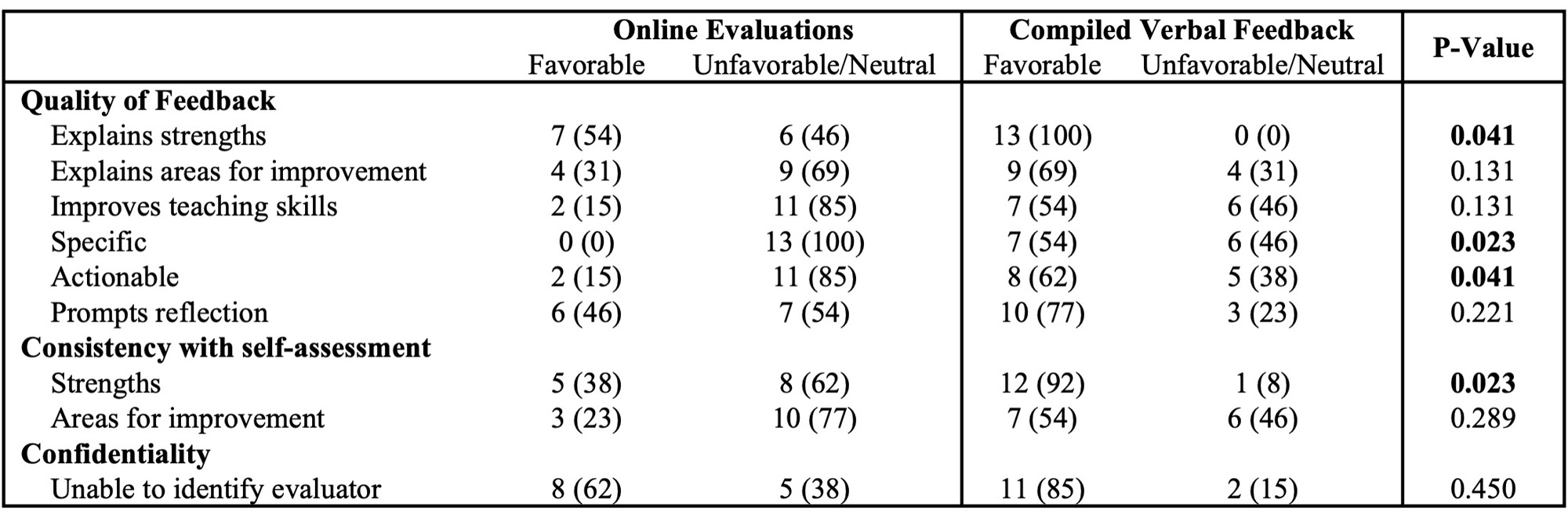Session Information
Session Type: Poster Session C
Session Time: 9:00AM-11:00AM
Background/Purpose: Feedback from fellows-in-training (FITs) is important for faculty professional development and to enrich clinical teaching in rheumatology fellowship training programs. Most fellowship training programs use online evaluations completed annually by FITs to provide feedback on clinical teaching by faculty. The quality of feedback provided through this mechanism may be limited by time burden on trainees and concerns for confidentiality. We sought to evaluate the effectiveness of online evaluations vs. a novel feedback mechanism of compiled verbal feedback.
Methods: We developed a novel feedback system in which FITs provided verbal feedback on all faculty to a facilitator who then compiled the feedback and shared it in a de-identified manner with individual faculty members. Based on the FITs’ preferences, this was done with all FITs together as a group and facilitated by the fellowship training program director. FITs also completed standard annual anonymous online evaluations for all faculty with whom they worked. All FITs and faculty in our institution’s Rheumatology Division were invited to participate voluntarily in the study; study investigators (one FIT, two faculty) were excluded. Participating FITs and faculty completed surveys assessing the perceived effectiveness of feedback and confidentiality of both forms of evaluation. Surveys used Likert scales (1=”Strongly Disagree”; 5=”Strongly Agree”). Responses were converted into two categorical variables: “Favorable,” representing responses 4-5 or 1-2 depending on question phrasing; and “Neutral/Unfavorable,” representing all other answer choices. Comparisons of paired responses between the two feedback mechanisms were performed using McNemar tests.
Results: Thirteen of 15 eligible faculty and 4/4 eligible FITs completed both surveys. Faculty responses in both surveys are summarized in Table 1. Favorable responses were numerically higher in all questions for the compiled verbal feedback system and statistically significantly higher in questions on the feedback’s effectiveness in explaining strengths, specificity, actionability, and consistency with faculty self-assessment of strengths. FIT responses are summarized in Table 2. FITs responses were largely neutral/unfavorable in most questions regarding online evaluations; no FITs responded favorably to the two questions on confidentiality of online evaluations. In contrast, all FITs responded favorably to every question in the survey on compiled verbal feedback with one exception: concerns about confidentiality. Although only one FIT responded favorably to this question, all FITs responded favorably regarding concerns about future interactions with evaluated faculty.
Conclusion: Compiled verbal feedback by FITs produced more actionable and effective feedback with no concerns for future interactions with faculty when compared with standard online evaluations, as perceived by both FITs and faculty. Other fellowship training programs may consider incorporating compiled verbal feedback to enrich the quality of feedback provided to faculty on clinical teaching. Further study of this method across different program sizes and institutions is warranted.
To cite this abstract in AMA style:
Katz G, Miloslavsky E, Fernandes A, Bolster M. Compiled Verbal Feedback as a Novel Mechanism for Faculty Feedback from Rheumatology Fellows-in-Training [abstract]. Arthritis Rheumatol. 2023; 75 (suppl 9). https://acrabstracts.org/abstract/compiled-verbal-feedback-as-a-novel-mechanism-for-faculty-feedback-from-rheumatology-fellows-in-training/. Accessed .« Back to ACR Convergence 2023
ACR Meeting Abstracts - https://acrabstracts.org/abstract/compiled-verbal-feedback-as-a-novel-mechanism-for-faculty-feedback-from-rheumatology-fellows-in-training/


